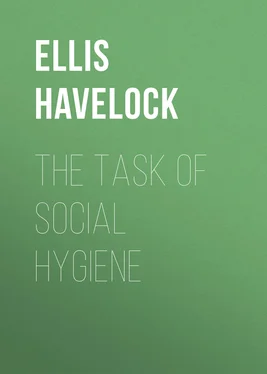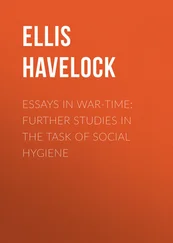Havelock Ellis - The Task of Social Hygiene
Здесь есть возможность читать онлайн «Havelock Ellis - The Task of Social Hygiene» — ознакомительный отрывок электронной книги совершенно бесплатно, а после прочтения отрывка купить полную версию. В некоторых случаях можно слушать аудио, скачать через торрент в формате fb2 и присутствует краткое содержание. Жанр: psy_sex_and_family, foreign_psychology, foreign_edu, на английском языке. Описание произведения, (предисловие) а так же отзывы посетителей доступны на портале библиотеки ЛибКат.
- Название:The Task of Social Hygiene
- Автор:
- Жанр:
- Год:неизвестен
- ISBN:нет данных
- Рейтинг книги:5 / 5. Голосов: 1
-
Избранное:Добавить в избранное
- Отзывы:
-
Ваша оценка:
- 100
- 1
- 2
- 3
- 4
- 5
The Task of Social Hygiene: краткое содержание, описание и аннотация
Предлагаем к чтению аннотацию, описание, краткое содержание или предисловие (зависит от того, что написал сам автор книги «The Task of Social Hygiene»). Если вы не нашли необходимую информацию о книге — напишите в комментариях, мы постараемся отыскать её.
The Task of Social Hygiene — читать онлайн ознакомительный отрывок
Ниже представлен текст книги, разбитый по страницам. Система сохранения места последней прочитанной страницы, позволяет с удобством читать онлайн бесплатно книгу «The Task of Social Hygiene», без необходимости каждый раз заново искать на чём Вы остановились. Поставьте закладку, и сможете в любой момент перейти на страницу, на которой закончили чтение.
Интервал:
Закладка:
The control of reproduction, we see, essential as it is, cannot by itself carry far the betterment of the race, because it involves no direct selection of stocks. Yet we have to remember that though this control, with the limitation of offspring it involves, fails to answer all the demands which Social Hygiene to-day makes of us, it yet achieves much. It may not improve what we abstractly term the "race," but it immensely improves the individuals of which the race is made up. Thus the limitation of the family renders it possible to avoid the production of undesired children. That in itself is an immense social gain, because it tends to abolish excessive infantile mortality. 18 18 It is unnecessary to touch here on the question of infant mortality, which has already been referred to, and will again come in for consideration in a later chapter. It need only be said that a high birth-rate is inextricably combined with a high death-rate. The European countries with the highest birth-rates are, in descending order: Russia, Bulgaria, Roumania, Servia, and Hungary. The European countries with the highest death-rates are, in descending order, almost the same: Russia, Hungary, Spain, Bulgaria, and Servia, It is the same outside Europe. Thus Chile, with a birth-rate which comes next after Roumania, has a death-rate that is only second to Russia.
It means that adequate care will be expended upon the children that are produced, and that no children will be produced unless the parents are in a position to provide for them. 19 19 Nyström ( La Vie Sexuelle , 1910, p. 248) believes that "the time is coming when it will be considered the duty of municipal authorities, if they have found by experience or have reason to suspect that children will be thrown upon the parish, to instruct parents in methods of preventive conception."
Even the mere spacing out of the children in a family, the larger interval between child-births, is a very great advantage. The mother is no longer exhausted by perpetually bearing, suckling, and tending babies, while the babies themselves are on the average of better quality. 20 20 The directly unfavourable influences on the child of too short an interval between its birth and that of the previous child has been shown, for instance, by Dr. R.J. Ewart ("The Influence of Parental Age on Offspring," Eugenics Review , October, 1911). He has found at Middlesbrough that children born at an interval of less than two years after the birth of the previous child still show at the age of six a notable deficiency in height, weight, and intelligence, when compared with children born after a longer interval, or with first-born children.
Thus the limitation of offspring, far from being an egoistic measure, as some have foolishly supposed, is imperatively demanded in the altruistic interests of the individuals composing the race.
But the control of reproduction, enormously beneficial as it is even in its most elementary shapes, mainly concerns us here because it furnishes the essential condition for the development of Social Hygiene. The control of reproduction renders possible, and leads on to, a wise selection in reproduction. It is only by such selection of children to be born that we can balance our indiscriminate care in the preservation of all children that are born, a care which otherwise would become an intolerable burden. It is only by such selection that we can work towards the elimination of those stocks which fail to help us in the tasks of our civilization to-day. It is only by such selection that we can hope to fortify the stocks that are fitted for these tasks. More than two centuries ago Steele playfully suggested that "one might wear any passion out of a family by culture, as skilful gardeners blot a colour out of a tulip that hurts its beauty." 21 21 Tatler , Vol. II, No. 175, 1709.
The progress of civilization, with the self-control it involves, has made it possible to accept this suggestion seriously. 22 22 "Write Man for Primula, and the stage of the world for that of the greenhouse," says Professor Bateson ( Biological Fact and the Structure of Society , 1912, p. 9), "and I believe that with a few generations of experimental breeding we should acquire the power similarly to determine how the varieties of men should be represented in the generations that succeed." But Bateson proceeds to point out that our knowledge is still very inadequate, and he is opposed to eugenics by Act of Parliament.
The difference is that whereas the flowers of our gardens are bettered only by the control of an arbitrary external will and intelligence, our human flowers may be bettered by an intelligence and will, a finer sense of responsibility, developed within themselves. Thus it is that human culture renders possible Social Hygiene.
Three centuries ago an inspired monk set forth his ideal of an ennobled world in The City of the Sun . Campanella wrote that prophetic book in prison. But his spirit was unfettered, and his conception of human society, though in daring it outruns all the visions we may compare it with, is yet on the lines along which our civilization lies. In the City of the Sun not only was the nobility of work, even mechanical work,—which Plato rejected and More was scarcely conscious of,—for the first time recognized, but the supreme impulse of procreation was regarded as a sacred function, to be exercised in the light of scientific knowledge. It was a public rather than a private duty, because it concerned the interests of the race; only valorous and high-spirited men ought to procreate, and it was held that the father should bear the punishments inflicted on the son for faults due to his failure by defects in generation. 23 23 E. Solmi, La Città del Sole di Campanella , 1904, p. xxxiv.
Moreover, while unions not for the end of procreation were in the City of the Sun left to the judgment of the individuals alone concerned, it was not so with unions for the end of procreation. These were arranged by the "great Master," a physician, aided by the chief matrons, and the public exercises of the youths and maidens, performed in a state of nakedness, were of assistance in enabling unions to be fittingly made. No eugenist under modern conditions of life proposes that unions should be arranged by a supreme medical public official, though he might possibly regard such an official, if divested of any compulsory powers, a kind of public trustee for the race, as a useful institution. But it is easy to see that the luminous conception of racial betterment which, since Galton rendered it practicable, is now inspiring social progress, was already burning brightly three centuries ago in the brain of this imprisoned Italian monk. Just as Thomas More has been called the father of modern Socialism, so Campanella may be said to be the prophet of modern Eugenics.
By "Eugenics" is meant the scientific study of all the agencies by which the human race may be improved, and the effort to give practical effect to those agencies by conscious and deliberate action in favour of better breeding. Even among savages eugenics may be said to exist, if only in the crude and unscientific practice of destroying feeble, deformed, and abnormal infants at birth. In civilized ages elaborate and more or less scientific attempts are made by breeders of animals to improve the stocks they breed, and their efforts have been crowned with much success. The study of the same methods in their bearing on man proceeded out of the Darwinian school of biology, and is especially associated with the great name of Sir Francis Galton, the cousin of Darwin. Galton first proposed to call this study "Stirpiculture." Under that name it inspired Noyes, the founder of the Oneida Community, with the impulse to carry it into practice with a thoroughness and daring—indeed a similarity of method—which caused Oneida almost to rival the City of the Sun. But the scheme of Noyes, excellent as in some respects it was as an experiment, outran both scientific knowledge and the spirit of the times. It was not countenanced by Galton, who never had any wish to offend general sentiment, but sought to win it over to his side, and before 1880 the Oneida Community was brought to an end in consequence of the antagonism it aroused. Galton continued to develop his conceptions slowly and cautiously, and in 1883, in his Inquiries into Human Faculty , he abandoned the term "Stirpiculture" and devised the term "Eugenics," which is now generally adopted to signify Good Breeding.
Читать дальшеИнтервал:
Закладка:
Похожие книги на «The Task of Social Hygiene»
Представляем Вашему вниманию похожие книги на «The Task of Social Hygiene» списком для выбора. Мы отобрали схожую по названию и смыслу литературу в надежде предоставить читателям больше вариантов отыскать новые, интересные, ещё непрочитанные произведения.
Обсуждение, отзывы о книге «The Task of Social Hygiene» и просто собственные мнения читателей. Оставьте ваши комментарии, напишите, что Вы думаете о произведении, его смысле или главных героях. Укажите что конкретно понравилось, а что нет, и почему Вы так считаете.












